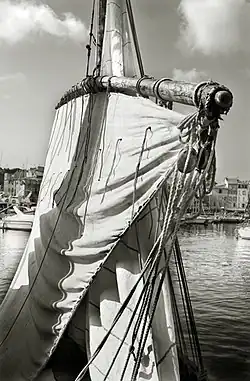sail
English

with the wind filling their sails


Pronunciation
- IPA(key): /seɪl/, [seɪ̯ɫ]
Audio (US) (file) - Rhymes: -eɪl
- Homophone: sale
Etymology 1
From Middle English saile, sayle, seil, seyl, from Old English seġl, from Proto-West Germanic *segl, from Proto-Germanic *seglą. Cognate with West Frisian seil, Low German Segel, Dutch zeil, German Segel, Danish sejl, Swedish segel.
Noun
sail (countable and uncountable, plural sails)
- (nautical) A piece of fabric attached to a boat and arranged such that it causes the wind to drive the boat along. The sail may be attached to the boat via a combination of mast, spars and ropes.
- c. 1595–1596 (date written), William Shakespeare, “A Midsommer Nights Dreame”, in Mr. William Shakespeares Comedies, Histories, & Tragedies: Published According to the True Originall Copies (First Folio), London: […] Isaac Iaggard, and Ed[ward] Blount, published 1623, OCLC 606515358, [Act II, scene i]:
- When we haue laught to ſee the ſailes conceiue / And grow big bellied with the wanton winde; […]
-
- (nautical, uncountable) The concept of a sail or sails, as if a substance.
- Take in sail: a storm is coming.
- (uncountable) The power harnessed by a sail or sails, or the use of this power for travel or transport.
- A trip in a boat, especially a sailboat.
- Let's go for a sail.
- (dated, plural "sail") A sailing vessel; a vessel of any kind; a craft.
- Twenty sail were in sight.
- 1945 May and June, Charles E. Lee, “The Penrhyn Railway and its Locomotives—1”, in Railway Magazine, page 142, text published 1848:
- " […] The quay is upwards of 1,000 feet in length, and capable of accommodating more than 100 sail of traders; and there are generally a considerable number of vessels of from 40 to 300 tons burden, from various parts of the world, waiting to receive their cargoes."
- (nautical) The conning tower of a submarine.
- The blade of a windmill.
- A tower-like structure found on the dorsal (topside) surface of submarines.
- The floating organ of siphonophores, such as the Portuguese man-of-war.
- (fishing) A sailfish.
- We caught three sails today.
- (paleontology) an outward projection of the spine, occurring in certain dinosaurs and synapsids
- Anything resembling a sail, such as a wing.
- 1596, Edmund Spenser, “Book V, Canto IV”, in The Faerie Queene. […], London: […] [John Wolfe] for William Ponsonbie, OCLC 960102938, stanza 42:
- Like an eagle […] soaring / / To weather his broad sails.
-
Hyponyms
- See also Thesaurus:sail
Derived terms
- balloon sail
- by sail
- drag sail
- mainsail
- point of sail
- sailback
- sailboard
- sailboat
- sailcloth
- sailduck
- sailer
- sailfish
- sailing
- sailyard
- sailyarn
- strike sail
- studding sail
- set sail
- take the wind out of someone's sails
- topsail
- working sail
Translations
|
|
|
|
|
|
- The translations below need to be checked and inserted above into the appropriate translation tables. See instructions at Wiktionary:Entry layout § Translations.
|
Etymology 2
From Middle English sailen, saylen, seilen, seilien, from Old English seġlan, siġlan (“to sail”), from Proto-West Germanic *siglijan, from *siglijaną. Cognate with West Frisian sile, Low German seilen, Dutch zeilen, German segeln, Danish sejle, Swedish segla, Icelandic sigla.
Verb
sail (third-person singular simple present sails, present participle sailing, simple past and past participle sailed)
- To be impelled or driven forward by the action of wind upon sails, as a ship on water; to be impelled on a body of water by steam or other power.
- To move through or on the water; to swim, as a fish or a waterfowl.
- To ride in a boat, especially a sailboat.
- (intransitive) To set sail; to begin a voyage.
- We sail for Australia tomorrow.
- To move briskly and gracefully through the air.
- c. 1591–1595 (date written), William Shakespeare, “The Tragedie of Romeo and Ivliet”, in Mr. William Shakespeares Comedies, Histories, & Tragedies […] (First Folio), London: […] Isaac Iaggard, and Ed[ward] Blount, published 1623, OCLC 606515358, [Act II, scene ii]:
- As is a winged messenger of heaven, […] / When he bestrides the lazy pacing clouds, / And sails upon the bosom of the air.
- 2002 March 20, Kazuki Takahashi, Yu-Gi-Oh! Forbidden Memories (PlayStation video game, North American version), Konami:
- [flavor text of the card "Spirit of the Winds"] A spirit of the wind that freely sails the skies.
- 2011 April 15, Saj Chowdhury, “Norwich 2 - 1 Nott'm Forest”, in BBC Sport:
- A hopeful ball from Forest right-back Brendan Moloney to the left edge of the area was met first by Ruddy but his attempted clearance rebounded off Tyson's leg and sailed in.
-
- (intransitive) To move briskly but sedately.
- The duchess sailed haughtily out of the room.
- (card games, transitive) To deal out (cards) from a distance by impelling them across a surface.
- 2007, Johnny Hughes, Texas Poker Wisdom (page 22)
- He would sit his hat across the room, and we would sail cards into it.
- 2007, Johnny Hughes, Texas Poker Wisdom (page 22)
Derived terms
- sail close to the wind
Translations
|
|
|
Further reading
 Sail on Wikipedia.Wikipedia
Sail on Wikipedia.Wikipedia  Sail in the Encyclopædia Britannica (11th edition, 1911)
Sail in the Encyclopædia Britannica (11th edition, 1911)
Anagrams
- Alis, Ilsa, Isla, LIAs, LISA, Lias, Lisa, SiAl, ails, lais, lias, sial
Basque
Noun
sail
- area
Dutch
Etymology
Borrowed from English sail. Doublet of zeil.
Pronunciation
- IPA(key): /seːl/
- Hyphenation: sail
- Rhymes: -eːl
Noun
sail n (plural sails)
- (nautical) The fin or sail of a submarine.
- Synonym: toren
Irish
Pronunciation
- IPA(key): /salʲ/
Etymology 1
From Old Irish sal, from Proto-Celtic *salā.
Noun
sail f (genitive singular saile)
- dirt, dross, impurity
- sail mhiotail ― metal dross
- stain, defilement
- sail pheaca ― the stain of sin
Declension
Second declension
Bare forms (no plural form of this noun)
| Forms with the definite article
|
Alternative forms
- sal
Derived terms
- sail chnis
- sail chluaise
- sail chaorach
- sailchuach
Related terms
- salach
- salachar
- salaigh
Further reading
- G. Toner, M. Ní Mhaonaigh, S. Arbuthnot, D. Wodtko, M.-L. Theuerkauf, editors (2019), “sal”, in eDIL: Electronic Dictionary of the Irish Language
- Dinneen, Patrick S. (1904), “sal”, in Foclóir Gaeḋilge agus Béarla, 1st edition, Dublin: Irish Texts Society, page 589
- Ó Dónaill, Niall (1977), “sail”, in Foclóir Gaeilge–Béarla, Dublin: An Gúm, →ISBN
- Entries containing “sail” in New English-Irish Dictionary by Foras na Gaeilge.
Etymology 2
From Old Irish sail, from Proto-Celtic *salixs (whence also Welsh helyg, Breton halegen), from Proto-Indo-European *sl̥H-ik- (“willow”). Cognate with Latin salix, Old English sealh and English sallow.
Noun
sail f (genitive singular saileach, nominative plural saileacha)
- willow (any of various trees or shrubs in the genus Salix)
Declension
Fifth declension
Bare forms
| Forms with the definite article
|
Derived terms
- saileach
- saileog
Further reading
- G. Toner, M. Ní Mhaonaigh, S. Arbuthnot, D. Wodtko, M.-L. Theuerkauf, editors (2019), “sail”, in eDIL: Electronic Dictionary of the Irish Language
- Dinneen, Patrick S. (1904), “sail”, in Foclóir Gaeḋilge agus Béarla, 1st edition, Dublin: Irish Texts Society, page 587
- Ó Dónaill, Niall (1977), “sail”, in Foclóir Gaeilge–Béarla, Dublin: An Gúm, →ISBN
Mutation
| Irish mutation | ||
|---|---|---|
| Radical | Lenition | Eclipsis |
| sail | shail after an, tsail | not applicable |
| Note: Some of these forms may be hypothetical. Not every possible mutated form of every word actually occurs. | ||
Portuguese
Etymology
Alteration of saim.[1]
Pronunciation
- (Brazil) IPA(key): /saˈiw/ [saˈiʊ̯]
- (Portugal) IPA(key): /sɐˈil/ [sɐˈiɫ]
- Homophone: saiu (Brazil)
- Rhymes: (Brazil) -iw
- Hyphenation: sa‧il
Noun
sail m (uncountable)
- Alternative form of saim (“fish oil”)
References
- “sail” in Dicionário Priberam da Língua Portuguesa.
Volapük
Noun
sail (nominative plural sails)
- (nautical) sail
Declension
| singular | plural | |
|---|---|---|
| nominative | sail | sails |
| genitive | saila | sailas |
| dative | saile | sailes |
| accusative | saili | sailis |
| vocative 1 | o sail! | o sails! |
| predicative 2 | sailu | sailus |
- 1 status as a case is disputed
- 2 in later, non-classical Volapük only
Derived terms
- sailan
- sailön
Welsh
Etymology
From Middle Welsh seil, from Proto-Brythonic *söl, from Latin solea (“sole”).
Pronunciation
- IPA(key): /sai̯l/
- Rhymes: -ai̯l
Noun
sail f (plural seiliau, not mutable)
- base, basis, foundation
- Synonym: sylfaen
Derived terms
- seiliedig (“established; fundamental”)
Further reading
- R. J. Thomas, G. A. Bevan, P. J. Donovan, A. Hawke et al., editors (1950–present), “sail”, in Geiriadur Prifysgol Cymru Online (in Welsh), University of Wales Centre for Advanced Welsh & Celtic Studies